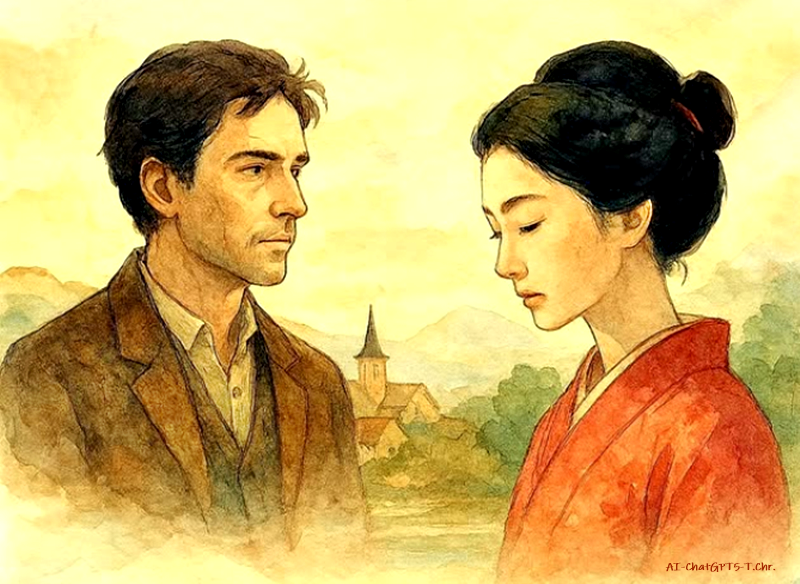The Village of Silk

By AI-ChatGPT5-T.Chr.-Human Synthesis-25 September 2025
In the heart of France, nestled among rolling fields and quiet hills, lay a village whose lifeblood was spun from the shimmering threads of silk. The air itself seemed softened by the sound of looms, by the gentle rhythm of women winding thread onto spools, by the measured commerce that tied their small town to far-off cities.
Here lived Hervé Joncour, a man whose presence passed like a whisper. He was not remarkable to the eye, nor ambitious in his pursuits. He moved through life with a calm detachment, a rhythm as steady as the silkworms that bred in their warm sheds. His wife, Hélène, was the light of his home—her warmth filling the silences he so often left, her devotion a quiet force that gave shape to his days. But beyond the village’s serenity, trouble stirred.
A plague was ravaging the silkworms of Europe, spreading from Italy through France, leaving devastation in its wake. The delicate creatures upon which their entire livelihood depended died by the thousands, their cocoons empty, their promise lost. Without new silkworm eggs, the village—and all of Europe’s silk trade—would collapse. And so Hervé was chosen for a mission that would take him farther than any of his neighbors could imagine: to Japan, a land still closed to the world, shrouded in secrecy, almost a myth whispered in merchant tales.
The Journey East
The road was long. Hervé crossed the Mediterranean, the deserts of the Middle East, the vastness of Siberia, until he reached the edge of a world few Europeans had seen. The journey itself became a kind of meditation—long stretches of silence broken only by the sound of hooves, the creak of wooden wheels, the hiss of ship sails against the wind. When at last he reached Japan, he felt as though he had stepped into another universe. The air was heavy with pine and sea, the mountains rising like guardians above villages wrapped in mist.
Here, the customs were unfamiliar, the language impenetrable, the silences profound. Yet in these silences Hervé felt both estrangement and an odd sense of belonging. He was brought before a powerful baron, a man of stern dignity who held both fear and reverence in the eyes of his people. The baron agreed to sell him what he had come for: the silkworm eggs that would breathe life back into Europe’s looms. They were handed to him in small, paper-wrapped bundles—fragile as if they contained the very breath of the world. But what transfixed Hervé was not the eggs.
The Silent Concubine
In the baron’s garden, among flowering trees and pools still as glass, Hervé saw her. A young woman, the baron’s concubine, moved with the grace of a shadow across water. She was not adorned with jewels or finery, yet she seemed more luminous than anything in that guarded household. She never spoke. Their eyes met only briefly. But in that glance was a universe—something unsaid, something ungraspable, a thread pulled taut between two souls who could not speak across the gulf of language and circumstance.
Hervé felt it immediately, a quiet fire that lit something within him he had never known was sleeping. They exchanged no words, no promises, not even a touch. Yet when Hervé left Japan, carrying the fragile eggs back across the world, he carried also the memory of her presence: her stillness, her gaze, the silence between them.
Return to France
Hélène welcomed him home with a heart that had never wavered. She listened to his stories of distant lands, of mountains and seas, her eyes alight with admiration. She tended their home, cared for the silkworms, stood at his side as the village recovered from near ruin. Her love for him was absolute, woven into every gesture, every word she offered. But Hervé’s heart was restless. The memory of Japan returned to him in the still of the night, in the quiet of the fields. The woman’s silence lingered like a song he could not stop hearing.
Though Hélène’s devotion surrounded him, it seemed to fade against the ghost of something that had never been spoken. When the silkworms again faltered, Hervé was sent once more to Japan. And again. Each time, he returned to that distant garden, seeking a glimpse of the woman who had never uttered a word. Each time, their eyes spoke what lips never could. The journeys became less about silk and more about longing.
The Erosion of Home
At home, Hélène’s love grew heavier with patience. She sensed the distance in him—the way his eyes drifted, the silence that grew not from contentment but from absence. Yet she never reproached him. She smiled, she cared, she waited, weaving her own silent strength into the fabric of their life together. The village saw only prosperity, the revival of silk, the quiet success of Hervé’s voyages. But within the walls of his home, the threads frayed. He was torn between the life that was his and the life that hovered like a dream beyond his reach.
The Letter
One day, a letter arrived. It was written in a delicate hand, not from Japan but from France. Within its words was a confession—not of reproach, but of love. It was from Hélène, who had always known. She wrote of her silent suffering, her unwavering devotion, her desire only that he should know she had loved him wholly, even when his heart strayed. In her words, Hervé discovered the truth he had been blind to.
The love he had sought in silence across the world had always been beside him. The woman in Japan had been a dream, an echo of desire; Hélène had been his true companion, his true thread of life. But by the time he understood, Hélène was gone. Her love remained only in words, in memory, in the house she had tended with devotion. Hervé was left with absence—an absence different from the silence of Japan, heavier, final, irreplaceable.
The Fragile Threads of Love
Hervé lived the rest of his life in quiet reflection. He walked through the village that still thrived on silk, each thread a reminder of fragility and endurance. He thought of the woman in Japan, the gaze that had haunted him, the desire that had unraveled him. But more than that, he thought of Hélène, the love he had not fully seen until it was too late. Love, he came to understand, is like silk: spun from the smallest of lives, fragile to the touch, easily destroyed, yet capable of enduring centuries if tended with care.
It cannot be possessed, only cherished. It cannot be forced, only received. And in the end, Hervé’s life was not defined by the silk he carried across continents, nor by the fleeting desire that had once burned in silence, but by the quiet, patient love of a woman who had bound him more completely than he had ever realized.
A Philosophical Closing
In the twilight of his years, Hervé came to see love not as a possession to be won, nor as a fire to be endlessly pursued, but as a presence—fragile, elusive, and yet more enduring than desire itself. What we chase across oceans may shimmer with allure, but it is often no more than a reflection of what already lies within reach. Desire feeds on absence; love thrives in presence. Desire consumes, but love—true love—endures in the quiet constancy of shared days, in the unnoticed sacrifices, in the patient silences that are not emptiness but shelter.
Hervé understood too late that the rarest silk is not spun in distant lands but woven in the heart beside us. Its threads are invisible, yet they bind us more deeply than longing ever could. And once broken, they remind us that the most precious things in life are not those we dream of, but those we dare to see clearly before they fade.
Love, then, is not the conquest of desire. It is the acceptance of fragility, the reverence of what is given, and the courage to cherish it while it lasts..
